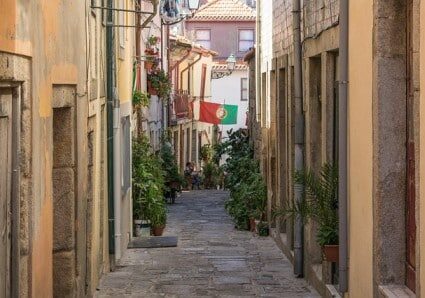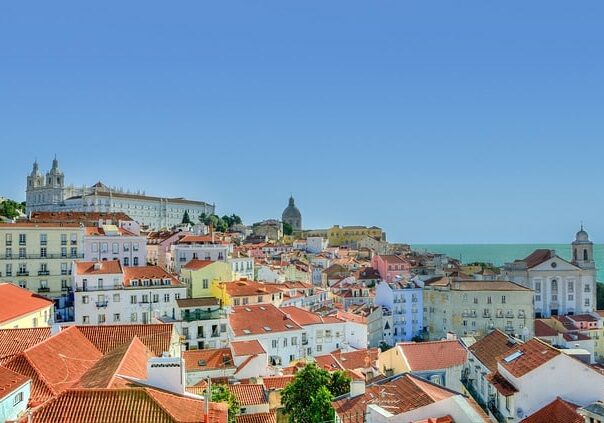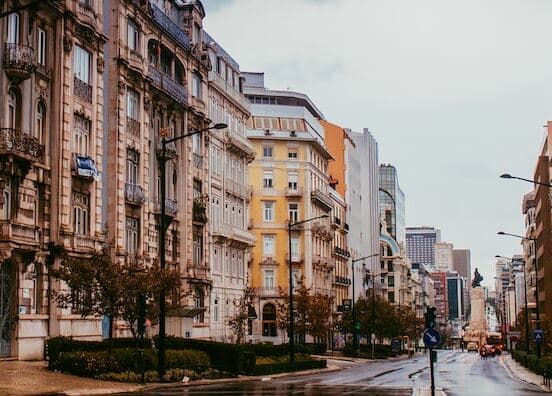Lisbon, Portugal’s capital city, is quickly becoming a favorite destination for digital nomads in Europe. The city is particularly attractive for temporary and long-term nomads and snowbirds alike.
There are many expats living in Lisbon because it offers easy access to everything you need and want from a European Mediterranean lifestyle, from beaches and art galleries to popular tourist attractions. Plus, if you’re looking for a modern coworking space in an exceptional setting, you’re sure to find it in Lisbon.
In this article, you’ll learn everything you need to know about living in Lisbon as a digital nomad, from the cost of living to the best visa options.
Is Lisbon a good place for digital nomads?

According to the latest Digital Nomadism Report, Portugal ranks 7th among the best places in the world for Digital Nomads. It ranks high in several key indicators such as internet speed, quality of life, English proficiency, and innovation.
Lisbon is inclusive and friendly. There is a community spirit amongst expats, and Lisbon people always make you feel welcome.
Lisbon digital nomads won’t have any trouble finding their feet and making new connections and friends, whether you are traveling solo or with others.
The Cost of Living in Lisbon as a Digital Nomad
According to recent estimates, the cost of living in Lisbon is cheaper than in 63% of cities across Western Europe. While Portugal generally has a lower cost of living than many other European countries, the amount of money you need depends on your spending habits and the area of the city you choose to live in.
Still, it is estimated that a single nomad living in Lisbon can get by on €1,200 per month, excluding additional costs for leisure and entertainment. The table below gives some insight into the basic needs of one person:
Expenses (per month) | Cost (per month) | |
Rent for one bed flat (city center/ outside city center) | €1,334/ €922 | |
Utility bills | €134 | |
Mobile phone & WiFi | €61.76 | |
Groceries | €200 to €340 | |
Public transport (monthly pass) | €40 | |
Entertainment (eating out/ cinema, etc.) | €50 | |
Sports and leisure | €40 | |
As with every city, rental prices in Lisbon’s city center are higher. So, if you’re thinking of living in the Lisbon area, it’s important to consider your finances and spending habits before making a commitment. Of course, you don’t have to live in Lisbon’s center. Its suburban areas are vibrant and buzzing with life, including coffee shops and great restaurants, making them a more affordable option to the city center.
However, Lisbon offers value for money, despite becoming a not-so-well-kept secret dream location for digital and European nomads.
Do you need a Digital Nomad Visa for Lisbon?

However, working remotely in Portugal from a non-EU country seeking to stay in Lisbon require a Digital Nomad Visa. To qualify, applicants must show that they earn at least four times the Portuguese minimum wage (€3,280 per month, which is approximately $3,489.). If this is the case, you can apply for the Portugal Digital Nomad Visa.
The Digital Nomad Visa has been available since 30 October 2022, and there are two options for digital nomads: You can obtain a 12-month visa and work remotely anywhere in Portugal. You can also apply for a Residency Visa, which lets you stay in the country longer, up to five years. Both options are a great way to experience nomad life and sunny summers, either temporarily or for a longer period of time.
The Best Time to Move to Lisbon
Many nomads want to know what is the weather like in Lisbon throughout the year. With its Mediterranean climate, hot and sunny summers, and mild winters, Lisbon is the ideal location for those who wish to escape the colder climates of their home countries. Lisbon is considered the warmest city on the Iberian Peninsula during winter, making it a wonderful place for people chasing warmer climates.
Whilst you won’t need to pack your winter jumpers or snow boots, it’s still important to know that summers can be very hot, often above 35℃, and can last from four to six months. It may take some getting used to, so be sure to pack light clothing, bring sun-protective gear like sunblock and hats, and stay in the shade where possible.
As summertime near the Atlantic Ocean attracts many tourists, spring and autumn might be ideal times for you to travel to Lisbon and set up your digital nomad life.
Getting Around Lisbon — Public Transportation

Lisbon has seven steep hills and many cobbled streets, which makes getting around on foot a little challenging sometimes. Although we’d definitely recommend walking around as much as possible, you have plenty of transport options for those longer journeys and a good excuse to use Lisbon’s iconic yellow trams. The city has three funiculars and one elevator to help with this, although prices for these are slightly higher.
To use Lisbon’s metro and bus services, trams, and boats, you’ll need a travel card that costs around €40 a month. Alternatively, you may wish to buy a ticket for €1.50, which is valid for 60 minutes of travel time on the Carris and Metro networks. To navigate the public transport system, we recommend you use Citymapper, an app that locals use, too.
Taxis, Uber, and Bolt services are also available and cost a lot less than in other countries. They typically cost €7 to €15 for a one-way trip within the city. There’s also an added bonus with this option: Most Uber and Bolt drivers are locals who have expert knowledge of the city.
Despite its impressive public transportation system, Lisbon is not as well equipped to cater to disabled people and those with access needs. Should you require assistance, there are limited services that can accommodate wheelchairs.
Lisbon's Best Neighborhoods for Digital Nomads
Your first experience with Portuguese culture will be in the neighborhood you choose. Even if your abode is temporary, you want to ensure you live in the best community neighborhood according to your needs. Lisbon has 24 neighborhoods, so there is always plenty to do and explore, whether it’s peak or shoulder season.
Digital nomads tend to always find themselves living close to each other. Accommodation prices vary, especially when comparing the city center with outlying areas, but no matter where you’d like to live, Global Citizen Solutions has done the legwork for you to shortlist your ideal nomadic base:
Baixa
Located in central Lisbon, where the central square (Rossio Square) is located, this neighborhood is very busy and also pricier than others. It’s a good place if you’re looking to immerse yourself in the hustle and bustle of the city and have a bigger budget.
Alfama
You’re going to love Lisbon’s oldest quarter, with historic buildings, lots of cafes, and spots for tourists. It’s also home to many locals, including families. If you don’t mind narrow streets and a busy atmosphere, it may just be the place for you. Lisbon’s oldest neighborhood with its central location is a must-see for any digital nomad and those who visit Portugal.
Any guide to Lisbon will recommend that you also head to Miradouro de Santa Luzia, a terrace from which you can indulge in epic views across Alfama.
Príncipe Real
This district of Lisbon is its priciest and most exclusive. If you have an unlimited budget, this may be the place to live for you. Príncipe Real boasts lots of boutiques, coffee shops, artisan shops, and designer outlets. If you’re only visiting this area, make sure you head to the not-so-secret garden, Jardim de Príncipe Real. It’s the district’s focal point and home to a 100-year-old cypress tree.
Belém
Although this part of western Lisbon is home to many tourist attractions, Belem is situated just outside the city center. Many digital nomads in Portugal can travel to and from here via public transport. It’s also a great place for members of the digital nomad community Portugal has developed who want to enjoy life outside the immediate city center. It’s ideal if you’re after a less crowded living experience with lots of green spaces.
Parque das Nações
If central Lisbon is too intense for you, Parque das Nações may offer a happy medium at a reasonable cost of living. Although you may not find a close community here and you’d be a little farther away from the city’s famous attractions, Parque das Nações boasts modern architecture, plenty of open spaces, and lots of gastronomy and shopping opportunities.
Santos
A quiet place in this vibrant city, tucked between urban life and the waterfront, Santos is a serene area for digital nomads. With charming streets, cozy cafes, and local markets, it’s a perfect blend of urban convenience and peaceful surroundings.
Cascais
A pricier option outside of Lisbon, Cascais offers seaside living with sandy beaches and a lovely inclusive community. It’s for those who want to live in close proximity to the capital but prefer nature and idyllic seaside strolls.
Finding Short and Long-Term Apartment Rentals in Lisbon

- Booking.com is ideal for short stays in hotels and hostels or if you’d like to check out the neighborhood before committing to a more extended stay. You’re certain to get some good deals for some temporary living quarters.
- Airbnb allows you to search for a suitable place on your budget. You can rent a room and get to know the locals, which could be a good way to learn about Portuguese culture. Or, if you prefer some personal space, you can choose a private apartment.
- Spot a home lists anything from from a one-bedroom apartment to apartments with multiple bedrooms to studios and single rooms. To match it to your cost of living needs, you can set your budget and location before you search, making for a more efficient apartment hunt.
- Housing Anywhere similarly lets you find accommodation either with or without housemates. The spaces are limited to studio apartments and private rooms, so this is most useful for singles or a maximum of two digital nomads or if you want to stay long-term.
- Local Facebook groups are always a good option at no extra cost if you speak the lingo and are looking for something more long-term. In this case, you can also approach local estate agents to help you with your apartment search, and you may find a hidden gem while living in Lisbon.

Lisbon's Internet Speed
In digital nomad life, the internet is essential for a successful work-life abroad. Luckily, Portugal’s government heavily invested in a solid internet infrastructure with high speed and reliable coverage. As such, Lisbon has impressive internet download speeds, which means that you’ll have no problem carrying out any remote working tasks you need to do. Data on mobile networks reaches a median of 166.26 Mbps, while fixed broadband delivers a median of 175.97 Mbps
Costs depend on the provider and whether your WiFi is included in your rental bills, but you can expect to pay between €30 and €40 per month.
This is on par with other European capitals and an average price around western Europe.
Coworking Spaces in Lisbon

Many digital nomads work at least one day a week in a coworking space to break up their work week.
Many of those coworking spaces also offer private offices and meeting facilities, while some even have a rooftop deck, which is a good place to socialize, and you may be making friends. Whether you want the odd day away from working in your PJs or a regular base, we have some options for you in this digital nomad guide to get you started on Lisbon’s best coworking spaces:
- Heden coworking spaces have offices in four locations across Lisbon and flexible options according to your needs. The Graça location even includes an art studio. Prices start from €8 for half a day.
- Outside Cowork Cafe is a central coworking space for short—and long-term workers. Daily passes, which include free coffee and start at €17, are available.
- Idea Spaces offers everything from hotdesks to more permanent bases. To be in central Lisbon, choose its Palácio Sottomayor office. Prices start from €15 per day.
- Avila Spaces is located in the center of Lisbon and offers free coffee and speedy WiFi to help you through your day. Bonus: There’s a terrace to meet and connect with other freelancers or nomads. With fully equipped meeting rooms and a range of options from private office suites to various communal spaces, it’s probably the plushest of coworking spaces, with prices starting from €40 per day.
As well as these coworking spaces, there’s also a meetup group for digital nomads living in Lisbon, which provides opportunities to network and socialize. Lisbon Digital Nomads organizes meetups, coworking days, talks, and other events for the Lisbon digital nomad community. If you want to find more organizations like this one, you can try searching Facebook groups, as there are several for digital nomads and other expats.
Best Cafes with Wifi in Lisbon

Fabrica Coffee Roasters has multiple locations across Lisbon. Their cafés are ideal for each season, with plenty of indoor and outdoor seating. The coffee is great, and digital nomads are welcome in this coffee house.
Dear Breakfast is made for digital nomads with lots of power plugs, bright spaces, excellent food, and coffee to go about your work day. This coffee shop in a central location should be on the list of every digital nomad.
Copenhagen Coffee Lab is a popular place for the nomad community and students alike, and laptops are welcome. Copenhagen Coffee Lab’s baked goods and beverages are tasty and will keep you fuelled while you’re hard at work. If you enjoy working there, you’re in luck: Copenhagen Coffee Lab has multiple cafes across Lisbon, so there’ll be one located close to where you are.
If you’re looking for a cafe to relax rather than for remote work, Hello Kristof provides a tranquil retreat with its minimalist, Nordic-inspired décor. It has a curated collection of international magazines, ideal for a relaxing break from your screens. With its serene ambiance, it’s the perfect spot for work, reading, or simply unwinding in a calm setting.
Best Restaurants in Lisbon on a Digital Nomad Budget

Global Citizen Solutions has scoured the city for this digital nomad guide, and the following restaurants come highly recommended with an affordable price tag; €10 will go a long way in most places:
- Zé de Mouraria has two locations, one for lunch, and one for dinner. Its food is delicious, and portions are generous. It’s a great place for everyone living in Lisbon to sample Portuguese cuisine.
- Taberna da Casa do Alentejo is a hidden treasure favored by many locals. Sandwich prices start from €1.80, and the most expensive item on the menu is €10. If you’re lucky, you may be able to catch a traditional Fado music performance here.
- A Provinciana is nestled away in the center of Lisbon but serves up some of the best dishes for a little money. If you want to eat traditional Portuguese dishes, you’ll be able to try a different one every day.
- The Food Temple is a hotspot for those who prefer vegetarian food. A fusion of Portuguese and Asian cuisine and a changing menu keep customers coming back for more, so make sure you book in advance.
- AO26 – Vegan Food Project has rave reviews from its customers and is a perfect place for everyone who enjoys plant-based food. Make sure to book beforehand to avoid disappointment.
- LX Factory houses many restaurants, bars, and shops under one roof. The hip and trendy place combines art, culture, comedy nights, and workshops, making it popular with locals and nomads alike. LX Factory is a top spot for anyone living in Lisbon, and we can guarantee that you’ll absolutely love it.
Best Things to Do in Lisbon as Digital Nomad

Lisbon truly has something for everyone, no matter your interests, and at an affordable cost. Whether you’re a night owl and want to explore Lisbon’s nightlife in Bairro Alto, love stand-up comedy nights and cultural events, indulge in Lisbon’s Time Out Market Mercado da Ribeira, or want to hang out on one of Lisbon’s rooftop swimming pools whilst enjoying panoramic views – there’s something for everyone.
The list below is certainly not exhaustive but will give digital nomads in Lisbon a flavor of what they can do in their time away from the laptop.
Lisbon is a paradise for those who appreciate food and drink. Instead of searching for the best places to eat yourself, you can join a variety of tours, which has the added bonus of meeting new people, too. Lisbon hosts many food and wine tours and pub crawls, so you can indulge in local specialties and even enjoy some live music.
If you fancy getting stuck in yourself, you can also book traditional cooking lessons where you can cook authentic Portuguese dishes. No doubt, the famous Pasteis de Nata (egg custard tarts) will be among the things you’ll sample.
Pink Street, located in Cais do Sodré, is one of the most iconic places and a must-see destination in Lisbon. With its pink pavements and colorful umbrellas above the streets, Pink Street is a hotspot for restaurants, coffee shops, bars, and a vibrant and busy nightlife. Cais do Sodré is a great place for many nomads living in Lisbon and Portuguese people alike.
If one busy nightlife spot isn’t enough for you, then Bairro Alto will cater to all your needs. This surprising Lisbon neighborhood is quiet and quaint by day, featuring local street artists, historical buildings, and lots of local cuisines. Most digital nomads, other travelers who visit Lisbon, and locals come to Bairro Alto in the evening to enjoy Lisbon’s nightlife.
A haven for art and history lovers, Lisbon boasts many museums and possibilities to appreciate art. Nomads can spend hours in the impressive Berardo Collection Museum and admire artworks from famous artists. For history geeks, The Calouste Gulbenkian Museum shows artifacts from multiple centuries, whilst the Museu de Marinha is for all those interested in maritime history. For those wanting to see a palace, make sure you visit Mafra and indulge in its palace’s opulent treasures.
Lisbon has a lot to offer, but venturing further afield is equally recommended, as there are plenty of things to do in Portugal. Day trips to stunning locations outside Lisbon are a great way to explore.

Cascais, a small coastal town next to the Atlantic Ocean, is also worth a visit, with its beautiful marina. In the summer months, it can be a great place to unwind, as Praia de Cascais and Praia da Rainha are among the best beaches near Lisbon. Cascais is also close to the most western point in Europe, Cabo da Roca, which is well worth a visit. Popular with former Portuguese nobility and royalty, Cascais is rich in history and is home to many museums. James Bond fans may also like to know that Casino Estoril, in neighboring Estoril, inspired Ian Fleming’s Casino Royale.
Óbidos is a small town full of picturesque, white-washed houses, ideal for taking pictures and exploring a much-loved historic town. What’s more, its museum is home to over half a million books! If you visit in July, you will be able to experience a thriving medieval market at Óbidos’ castle, including medieval food and drink.
The beautiful Algarve Region in Portugal’s south is worth a trip for a few days to explore different beaches and towns or to escape to during winter as temperatures rarely go below 10℃. During the summer, it’s best to leave the region to tourists.
There’s also plenty on offer for those nomads who are thrill-seekers. Whether you fancy a hot air balloon ride or want to take up surfing or paragliding, Lisbon has it all! You can also go sailing at dusk, ride a horse on the beach, or fly above Lisbon in a helicopter.
Lisbon’s offer of fun activities is aplenty and a treasure trove for digital nomads of all ages and backgrounds. No matter your preferences, Lisbon is sure to cater to them.
Other Destinations in Portugal for Digital Nomads

- Porto is a must-visit city. Regarded as one of the best places in the world to work and live right now, it offers a lively social life, exciting nightlife and culture, and history galore! What’s more, for digital nomads on a tighter budget, it offers all the perks of city life at a lower price point.
- Braga is an excellent place for those seeking a quieter part of Portugal. Braga is in the northwest of the country and offers history, culture, and proximity to the sea. Even better, Braga is very close to Spain, so you can hop across the border for a Spanish adventure.
- Ponta do Sol, located on the island of Madeira, houses its own little village of digital nomads. It’s an ideal place if you’re after all-year-round sun and are just starting out as a digital nomad.
- Aveiro, also called “the Venice of Portugal,” boasts culture and picturesque backdrops everywhere you turn. It’s popular with artists and an equally charming base for digital nomads who want to feast their eyes on beautiful houses, canals, and gondola-style boats.
- Ponta Delgada is highly recommended for nature lovers. It offers hot springs, volcanos, beaches, and plenty of places to relax and unwind. You don’t have to worry about WiFi speed: Ponta Delgada is a trusted and popular destination among digital nomads.
Healthcare in Lisbon for Digital Nomads
While no one plans to be ill when they’re traveling as digital nomads, if you’re living in Lison even for a short while, understanding Portugal’s healthcare system is essential. Similar to that of the UK, its national health service makes healthcare free or very affordable for residents and citizens. Do note that there is still a small fee for some consultations and treatments.
Portugal’s exceptional healthcare system is also available for digital nomads who have legal residency in the country. Either way, you may want to take out private insurance, as it’s affordable and reliable.
If your home country is a member of the EU, the health service will be available to you automatically. Just ensure you have your valid EHIC card with you.
If you are from a non-EU country, you should ensure you have valid health insurance. There are a variety of providers out there offering suitable healthcare insurance for digital nomads.
For more information on suitable insurance and healthcare options for digital nomads in Lisbon, follow one of our detailed guides on Healthcare in Portugal for Foreigners.
Taxes for Digital Nomads in Portugal
If you live in Lisbon or elsewhere in Portugal, you must register as a Portuguese tax resident and pay taxes in Portugal. To get started, you’ll need an NIF (tax ID number). You can apply online or visit a tax office (Finanças) in person.
Once you have your NIF, visit the tax authority’s website (Portal das Finanças) and submit a form to declare your new tax activity. The Portuguese tax year runs from January to December, and returns are due between April and June of the following year. You can file online or use paper forms.
In 2024, the Portuguese tax rates are as follows:
Portuguese Income Tax Bands | Portuguese Tax Rate |
up to €8,059 | 13% |
€8,059–€12,160 | 16.5% |
€12,160-€17,233 | 22% |
€17,233-€22,306 | 25% |
€22,306-€28,400 | 32% |
€28,400-€41,629 | 35.5% |
€41,629-€44,987 | 43.5% |
€44,987-€83,696 | 45% |
€83,696+ | 48% |
Remember, timely filing is crucial to avoid penalties that can range from €200 to €2,500.
Why choose Global Citizen Solutions for your Immigration Visa?
GLOBAL APPROACH BY LOCAL EXPERTS
- GCS has offices located across Portugal.
- Members of the US-Portugal and UK-Portugal Chambers of Commerce in Portugal, and the Investment Migration Council (IMC).
- Our expert team can help you throughout your journey to secure your Visa.
100% APPROVAL RATE
- Our successful track record in applications provides reassurance to applicants.
- We have helped clients from more than 35 countries secure residency in Portugal.
ALL-ENCOMPASSING SOLUTION
- With a single channel of communication, our approach ensures that you have complete clarity on your application.
- Our BeGlobal® Onboarding System allows for a total flow of information.
TRANSPARENCY AND PRIVACY
- Our pricing is clear and detailed, you will not face any hidden costs.
- All data is stored within a GDPR-compliant database on a secure SSL-encrypted server.

Frequently Asked Questions about Digital Nomad Lisbon Life
Do I need a Digital Nomad Visa to work remotely in Lisbon?
If you’re an EU citizen, you won’t need a Digital Nomad Visa to work remotely in Lisbon. If you’re a non EU citizen, you will need to apply for the Digital Nomad Visa, which means that your income must be at least €3,280 per month.
What is the background check for the Digital Nomad Visa in Portugal?
To be eligible for the Digital Nomad Visa in Portugal, you must provide a clean criminal record from your country of origin
What is the cost of living like in Lisbon compared to other European cities?
As the Portuguese capital, Lisbon is more expensive than other cities in Portugal. However, it is cheaper to live in than many other major European cities. Without rent, your monthly spending might be around €600, including rent, it is likely to be €1,200 to €2,000.
Is Lisbon a safe city?
Lisbon is generally a safe city, but it’s important to be aware of safety concerns such as petty crime and pickpocketing. Portugal has relaxed policies on drugs, so be aware that people may approach you on the street to offer you susbstances.
What are the best neighborhoods in Lisbon city center for digital nomads?
Popular areas include Baixa, Chiado, and Alfama. Each offers a unique vibe, with Baixa being the most central and closest to several of the most popular tourist attractions.
What are the downsides of living in Lisbon as a digital nomad?
Portugal is currently going through a housing crisis, so while Lisbon is a less expensive city to live in than other major European cities, it has experienced rising costs for accommodation in recent years. Also, as it is a large city, with many tourists, there’s often traffic congestion.
Do digital nomads living in Lisbon have to pay taxes in Portugal?
If you live in Portugal for more than 183 days per year, you should register with the Portuguese tax authorities as a Portuguese tax resident. As such, you would be required to pay taxes in Portugal.
How much money do I need to live in Lisbon as a digital nomad?
To live a good life in Lisbon as a digital nomad, you’ll probably need to spend between €1,500 – €2,000 per month, which would cover rent, utilities, groceries, transportation, and some leisure activities for a single person
May I work in Lisbon if I have dual citizenship?
Yes. Portugal allows dual citizenship, but it’s important to check with your home country’s laws if it’s permitted.




